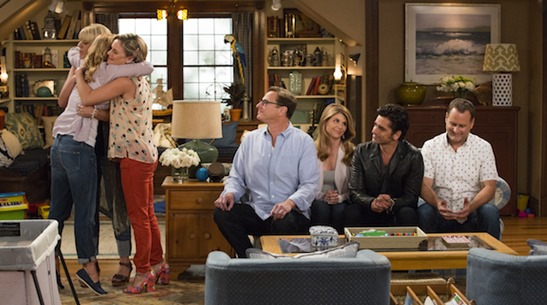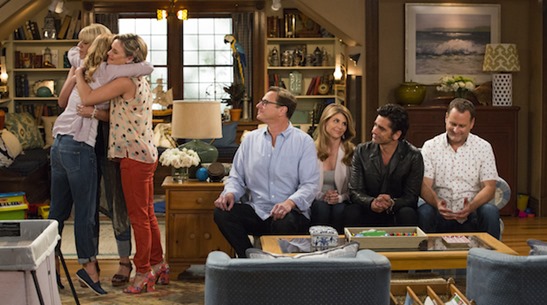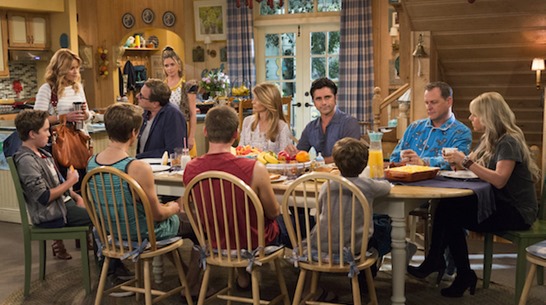Written by Katherine Murray.
I don’t remember thinking that the premiere episode of Fuller House was very good, and I don’t remember paying attention to anything that happened in the plot. What I do remember is crying because it has been 20 years, and I can almost imagine how strange it feels for all of these people to be in the same room again.
If you’re either nostalgic for 90s-era sitcoms or bummed that the Full House Reviewed blog had to end, Netflix just did you a solid by creating a Full House spin-off that features some of the original cast. The premise is that three of the grown-up kids from Full House – sisters DJ and Stephanie, played by Candance Cameron-Bure and Jodie Sweetin, plus annoying neighbour Kimmy Gibbler, played by Andrea Barber – return to their suspiciously spacious childhood home to raise DJ and Kimmy’s children after DJ’s husband dies. Other former cast members make guest appearances after that, but the premiere episode is the one that brings almost everyone from the original series back together, just long enough for each of them to say their catchphrases and leave. And, somehow, rather than being annoying, that’s one of the most touching things I’ve ever seen.
It’s not touching because it’s well-written or because Fuller House is a very good show – both the writing and the show are as blunt and dull as you’d expect. It’s touching because we’re all twenty years older, and “Our Very First Episode, Again” is a living, breathing snapshot of what it means to move through time.
I’ll confess that, while I was watching “Our Very First Episode, Again,” I wasn’t thinking about seeing DJ or Stephanie or Uncle So-and-So again. I also wasn’t thinking about the premiere episode of Full House and how much I loved watching it. I was thinking about a group of actors who used to see each other every day – people who grew up together, who watched each other grow up, who had a near-miss romance between them, who – whether or not they like it or want it to be true – will always be partly defined by Full House. People who had no way of knowing, when they shot the first episode, that they would always be loved and hated and judged and remembered for this weird, dumb show.
I was thinking about how they’d all had to make peace with that, in different ways, for twenty years. How some of them had even stopped acting during that time and moved on with their lives. And here they were, together again, on a set that looks like that set, calling each other by the names they had in that script, listening to people cheer for them for doing these weird, dumb, familiar things. They looked pleased and embarrassed and nervous and amused and the very best part of the episode was watching the faces of the other actors in the same shot when one of them barked out a catchphrase.
Netflix didn’t make Fuller House to be good. There are some self-deprecating jokes, but it’s not, like, a cool, hip reboot of the original series. It’s also not designed to introduce a new generation to TGIF. Fuller House exists to be a freaky time capsule that shows us all how much we’ve aged, how we can’t always choose what defines us, and how we make peace with legacies we have mixed feelings about.
I’m about the same age as Jodie Sweetin, and, when the super-nostalgic credit sequence fires up and shows us footage of her as a little girl, I am terrified and astounded by how old that makes me feel. It immediately reminds me of all the things I’ve experienced since I was that young, and it makes me a tiny bit invested in her character, in ways I never was when we were children. Similarly, there’s a scene where Candace Cameron-Bure’s character, DJ, starts crying because she’s all on her own, parenting, adulting, and not sure if she’s going to succeed, and, god dammit, that feels much more real to me now than it did when Jesse and Joey were messing up school trips and getting into fights with little kids. I feel a sense of solidarity with DJ that comes from nothing but the passage of time.
Fuller House is annoying in all the ways you’d expect – the jokes are lame; there are awkward musical guests; it’s weirdly heterosexist without being exactly homophobic; DJ’s kids are super loud – but that’s also part of the point. Everything is the same as it was in Full House – even, literally, the jacket John Stamos is wearing. The only thing that’s changed is that we all got older. And knowing that that’s all that changed makes the series a mirror, not to culture or society or anything we usually say that TV is a mirror to – it’s just a mirror to age.
It’s not exactly the same thing as cashing in on nostalgia – again, I don’t think anyone sat around missing Full House. It’s more like cashing in on narcissism – and I freely include myself as one of the narcissists, here. The draw of Fuller House is that it’s familiar and different at the same time – it sits somewhere next to the uncanny valley and Tír na nÓg, in a land that can only be accessed by people who were alive to see the original when it first aired, and where they can’t ever suspend disbelief for what they’re seeing. The episodes, for me, are not about the Tanner/Fuller/Gibbler family. They’re about how much these people’s lives have changed and not changed in 20 years, which makes me think about how much my life has changed and not changed in 20 years, and in what ways, and how I feel about that, and whether it’s good or bad. I mean, I think there’s Mexican wrestling or something in one episode, but that was really not the focus of my thoughts.
None of the episodes after the premiere hit me as hard, and most of them didn’t hit me at all, but I have to admit that, against anything I would have predicted, there really is something astounding about bringing this show back to life – even for only one episode. And, it’s something that only seems possible thanks to the Netflix model, where no one has to bank on this becoming appointment television. It’s something that seems specifically engineered for an age where all you have to bank on is that a few people will be in a weird mood one day and want to watch it.
So, if you’re in a weird mood one day, check it out. You will not be entertained but, if you’ve seen Full House before, you will also not be disappointed.
Katherine Murray is a Toronto-based writer who yells about movies, TV and video games on her blog.


